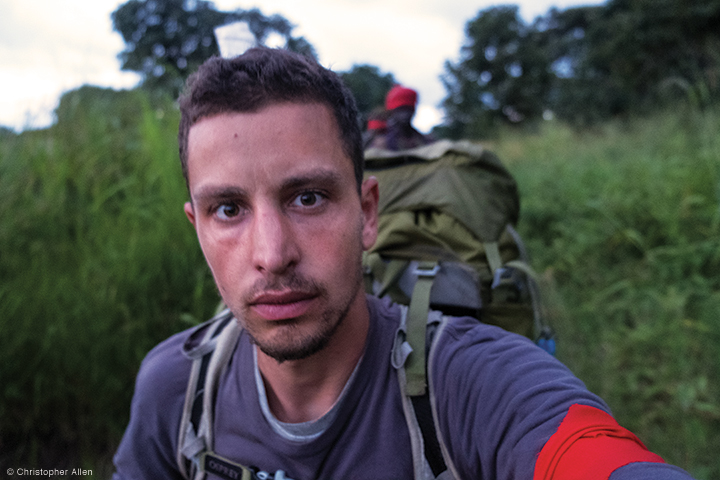
Trying to understand the loss of a young journalist and family friend, who was killed last year while covering the civil war in South Sudan.
BY SAMUEL HUGHES | Photography by Christopher Allen
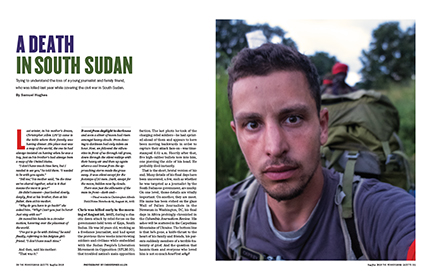
Last winter, in his mother’s dream, Christopher Allen LPS’13 came to the table where their family was having dinner. His place mat was a map of the world, the one he had always insisted on having when he was a boy, just as his brother’s had always been a map of the United States.
“I don’t have much time here, but I needed to see you,” he told them. “I needed to be with you again.”
“Tell me,” his mother said, “in the time we’ve shared together, what is it that means the most to you?”
He didn’t answer—just looked slowly, deeply, first at his brother, then at his father, then at his mother.
“Why do you have to go back?” she asked him. “Why? Can’t you just be here? Just stay with us!”
He moved his hands in a circular motion, hovering over the place mat of the world.
“I’ve got to go be with Helena,” he said finally, referring to his Belgian girlfriend. “I don’t have much time.”
And then, said his mother: “That was it.”
It went from daylight to darkness and soon a sliver of moon had risen amongst heavy clouds. From dancing to darkness had only taken an hour. Now, we followed the silhouettes in front of us through tall grass, down through the silent valleys with their heavy air and then up again where a cool breeze from the approaching storm made the grass sway. It was silent except for the footsteps of 20 men. Dark, except for the moon, hidden now by clouds.
There was just the silhouette of the man in front—dark and—
—Final words in Christopher Allen’s Field Notes Notebook #3, August 25, 2017.
Chris was killed early in the morning of August 26, 2017, during a chaotic dawn attack by rebel forces on the government-held town of Kaya, South Sudan. He was 26 years old, working as a freelance journalist, and had spent the previous three weeks interviewing soldiers and civilians while embedded with the Sudan People’s Liberation Movement-in-Opposition (SPLM-IO), that troubled nation’s main opposition faction. The last photo he took of the charging rebel soldiers—he had sprinted ahead of them and appears to have been moving backwards in order to capture their attack face-on—was time-stamped 6:52 a.m. Shortly after that, five high-caliber bullets tore into him, one piercing the side of his head. He probably died instantly.
That is the short, brutal version of his end. Many details of his final days have been uncovered; a few, such as whether he was targeted as a journalist by the South Sudanese government, are murky. On one level, those details are vitally important. On another, they are moot. His name has been etched on the glass Wall of Fallen Journalists in the Newseum in Washington, DC, his final days in Africa probingly chronicled in the Columbia Journalism Review. His ashes will be scattered in the Carpathian Mountains of Ukraine. The bottom line is that he’s gone, a knife-thrust to the heart of his family and friends, his parents suddenly members of a terrible fraternity of grief. And the question that haunts them and everyone who loved him is not so much how? but why?
How do I tell a story like this? And why? Those questions are tangled, too. I’ve wrestled with them since late last fall when Chris’s parents, Joyce Krajian and John Allen—close friends of my wife Pat’s and mine—broached the idea that I write it. (Chris’s brother, who asked that his name not be used for privacy issues, agreed that the Gazette was the right place for this piece, partly because it was “probably the only publication Chris wrote for where he didn’t want to kill his editor.”)
Background is important here. I usually try to keep a low profile in my stories, and while I knew Chris for much of his too-brief life, I was a very minor player in his drama. He and his brother grew up in our Philadelphia suburb of Narberth alongside my two sons, Tristan and Jesse. Chris and Tristan were friends since third grade, and the last time they were home together they went rock-climbing. Chris also became a serious mentor to Jesse, and the two often Skyped when Chris was in Ukraine and Jesse was a student majoring in broadcast journalism at the University of Colorado.
In recent years, our two parental units became increasingly close, with Pat and Joyce bonding deeply over shared worries. Over wine and Joyce’s Armenian delicacies, the four of us would fret and laugh and shake our heads over our challenging and often headstrong young men. Increasingly, the worries gravitated toward Chris—who, ironically, was the only one of our sons who never got in trouble with the local constabulary for the kind of dopey things teenagers get in trouble for in places like Narberth. On the Allens’ refrigerator was a card with the words: “Raising boys is an extreme sport.”
Four years ago I assigned and edited Chris’s first magazine article [“With the Donbas Battalion,” Nov|Dec 2014], which was a rewarding experience for both of us. Over the next few years I gave him whatever modest advice and encouragement I could, pushing him to write more for the Gazette and writing a recommendation for his 2016 proposal for a Fulbright in Nigeria—which, had it been approved, might have led to a very different outcome.
And so I find myself in a position that’s both privileged and fraught.
Fraught because everyone who knew this remarkable, warm, insanely principled young challenger of received wisdom has their own narrative, and because missteps of tone or fact are not easily overlooked. Chris packed a lot of intense living into his brief life, and he hated simplistic storylines. I once had to tell him to stop using the phrase irreducibly complex on the grounds that it was a cop-out. I doubt I can reduce his complexities to the storyline he deserves. But let me try.
“How else do you think I’m going to climb Mt. Everest?” Chris once said to three women on a SEPTA bus who had been cluck-clucking about the fact that he was wearing shorts on a very cold morning. “I’m training!” He wanted to make it clear that the shorts were his decision, not his mother’s. He was four years old.
“He was a risk-taker from a very early age,” says John, a transplanted Brit and former public school teacher whose polite, deferential manner belies his own adventuring past. (He once took a solo motorcycle trip through some extremely rugged sections of Pakistan, a trip that Chris would later replicate two weeks after Osama bin Laden was killed by American special forces.) “Chris would do things that the average Main Line kid wouldn’t dare to do. And we sort of nurtured that, in a way.”
That nurturing took many forms, including books and movies about mountain climbers and other adventurers. Chris was fascinated by explorers like Ernest Shackleton and Wilfred Thesiger, who pushed the limits of human endurance.
“He very much identified with Thesiger, right up until his time in South Sudan,” says John. “I think in some ways he wished he’d been born in the Victorian age, where people, gentlemen, would explore the Dark Continent. And he loved the world for that, too. He was averse to places that functioned really well.”
Polite and respectful in most circumstances, Chris was also quick to challenge authority when he found its reasoning unconvincing. He shared that trait with his mother, a Presbyterian minister whose warm idealism also includes a drive to cut through cant and right injustices. (Joyce’s spiritual path began in earnest at age 16, when she left her family’s Armenian Orthodox church, frustrated by all the “hocus pocus” and ring-kissing and patriarchal stunting of women and girls. “You ask too many questions!” the priest told her. “Just marry Armenian man and be happy.”)
Both parents passed on a relentless questioning of all things status quo.
“Our dinner table was wild with conversation about why and what,” Joyce says. “I felt very strongly that an education would not serve our kids unless they could emerge as independent thinkers and quality writers. The rest felt less significant to me.”
By the time Chris began frequenting our house, his questioning mechanism was highly tuned. Pat, who saw her full share of boys in those days, remembers Chris peppering her with question after question, most of which she couldn’t answer. He was, she concluded, “the most curious kid I’ve ever known.”
Questions sometimes led to uncomfortable answers, and throughout his elementary and middle school years, he and Joyce often clashed with teachers and counselors. Yet Chris was always a serious student, whose intensely challenging nature played out in the classroom and on the athletic field.
Tristan recalls soccer games where Chris would get his team revved up by “stomping around, waving his arms, and singing Queen’s ‘We Will Rock You,’ his face red, his eyes intense with passion.” Yet he never held it against anyone if he lost, Tristan adds. “You wanted to be on his team.”
If his high-tempered sense of principle often got him into scrapes—some comical—Chris nonetheless considered himself “very orderly and civilized, appreciating the structure of society and its conventions—even believing that the American rebels in the Revolution were out of line for attacking British soldiers when they stopped to have tea,” Tristan recalls. “His dad being British, he identified with that sense of orderly British society and would complain about America—until he went there in seventh grade and realized it wasn’t the pinnacle of perfection he thought it was.” A few years later, he became a dual US-British citizen.
By the end of middle school, his teachers appear to have been in two camps.
“I live to teach Chris,” his teacher in the Challenge program told Joyce. “He raises such good questions. They always move the conversation.”
Others found his persistent probing and contradicting annoying. So did some of his classmates. Things came to a head his final year there.
“All he wants to understand are the exceptions to the rule,” his math teacher told Joyce. “It drives me crazy.” His history teacher complained that he had told her: “What you said in class today contradicts what you said two weeks ago.”
“Well, you’ve got a kid who’s really listening,” Joyce responded. “Was he right?” “That’s not the point,” said the teacher.
That did it. Goodbye, Lower Merion School District.
Eddie Einbender-Luks was Chris’s best friend at Germantown Friends School, where Chris thrived throughout his high school years. But it took him a while to warm up to the new kid—who quickly “made himself very known.”
“He was opinionated. Difficult. Incredibly smart,” Eddie says, then hints at a smile. “Kind of an asshole.”
Their friendship grew on the track team. One cold winter afternoon the two, along with a couple of seniors, were running on a path by the Wissahickon Creek, when the older guys casually suggested that Chris wouldn’t jump into the frigid creek for $50. They kept running—until the others realized that Chris wasn’t there.
“We see him climbing out, drenched in water,” says Eddie. “And we’re like, ‘Holy shit—you’d better go back right now!’ And he’s like, ‘No—I’m going to continue to run with you.’” The others got him back to school before hypothermia set in, but Chris won the bet—and a kind of raised-eyebrow respect.
Academically, “he was like a kid in a candy shop at Germantown Friends,” says Joyce, who had to tap some generous friends and relatives to help with the tuition. “He kept creating these independent things, which would last for the semester, and taking an overload” of classes.
During his junior year there, Chris met his first Penn faculty member: Gareth Darbyshire, a research associate and Gordion archivist at the Penn Museum. He remembers Chris as a “very charismatic person, very sharp.”
“He had to do his junior project, and he was all into archaeology, and could he do it with us?” Darbyshire recalls. “The Penn Museum’s been digging in Gordion, near Ankara, since 1950, and we’ve got a huge amount of legacy data that was in analog format.” Chris began digitizing that data and soon asked if he could do something more focused for his class presentation. The result was a three-dimensional computer reconstruction of a modern person walking into a Persian period house.
“His computer reconstruction was very good,” Darbyshire notes. “And he did all this very quickly. I was very struck with his dynamic personality, the rapidity with which he grasped information and came up with something new and interesting. He was an avid reader as well, on a wide range of topics. In one month he made a big impression.”
After that, “Chris couldn’t picture himself anywhere but Penn,” says Joyce. He applied Early Decision. Darbyshire wrote a glowing recommendation. It wasn’t enough. Penn turned him down.
Joyce was told that the problem was his GPA, a very good but not outstanding 3.48; the cutoff was 3.5. His advisor at Germantown Friends told Joyce that the school had “done him a disservice” by letting him take an overload every semester, adding: “Everybody wants the spark that he brings to the classroom.”
Fast-forward through an unhappy freshman year at the venerable University of St. Andrews in Scotland, followed by three semesters at Temple University. At first he chafed at some of the unchallenging required courses, then came to admire the urban grittiness of its students, some of whom were working 40-hour weeks to pay the tuition. He also wangled his way into an upper-level philosophy course, which sparked a lasting friendship with the professor and her husband.
But his dream was still to go to Penn, and while the cost was an obstacle, he found what Joyce calls a “back door” entrance: Penn’s College of Liberal and Professional Studies, to which he immediately applied. This time, he got in.
Transferring to a place like Penn is not always easy. Now 21, older than most of his classmates, Chris formed an unlikely friendship with a Vietnam veteran named Alan McIntyre, who audited classes on a regular basis. The two met in a class on Tolstoy’s War and Peace taught by Peter Holquist (the Ronald S. Lauder Endowed Term Associate Professor of History) and Ilya Vinitsky (then a professor of Slavic languages and literatures). It was Chris’s favorite book, and he reveled in it. Holquist, who remembers Chris as a “very committed student” who did “very well in the course,” was struck by the friendship between the 21-year-old Chris and the 70-something McIntyre.
“Despite the difference in our ages, we got along very well,” recalls McIntyre, who often came to the Allens’ home for dinner. “The fact that he had done so much traveling was of interest to me. And the fact that I had been in Vietnam was of interest to him.”
In the spring of his senior year, the Penn History Review published a version of his thesis. It wastitled “Missions and the Mediation of Modernity in Colonial Kenya.” Africa was already calling.
A year later, one of Chris’s professors at the University of Oxford gave him some life-altering advice. It was 2014, and he was in his final term of the Europaeum Programme (a master’s program in history, divided among Leiden University, Panthéon/Sorbonne, and Oxford). By then he was restless and souring on academe. “You should go and see history being made,” his professor told him.
History was then erupting in Ukraine. The Maidan uprising in Kiev had just chased out the country’s Russian-supported president, Viktor Yanukovych. Soon after that, pro-Russian forces invaded and annexed Crimea.
“Ukraine was hot,” says John. “So Chris decided that for his spring break he wouldn’t be going to sunny Greece or Spain. He would go to Ukraine and see what was going on. He ended up right in Donetsk—where things were really hot.”
From there he called his parents. “It was very exciting to him,” John says. “Seeing a bunch of guys busting down the police headquarters doors and going up the stairs. He said, ‘I’m on the top of the police headquarters building!’ I said, ‘Get the fuck out of there, Chris.’ But he was in the midst of a revolution, and it was a totally transformative moment for him.”
As soon as he finished his classes at Oxford, he returned to Ukraine.
“This was his place,” says John. “He eventually moved to Kiev. He felt like it was home. It’s a little gritty in places. But that’s what he liked—‘Oh, there’s a demonstration down at Maidan. I want to go and see what’s going on.’ It wasn’t all good—there were some of the more creepy elements there, too, neo-fascist groups and such. And some of the volunteers were a little shadowy. But Chris did like the fact that these people would stand for something.”
He also saw the limits of journalism. “They’d write these short articles that didn’t really give the background,” John says. Chris was keen on providing context, for which few publications have the space and not many readers have patience.
Around that time Pat, who had spent 25 years in newspapers, got a call from Joyce. Chris had decided to become a freelance journalist and was looking for help getting published.
“I was like, ‘Does he know anything about freelancing?’ ‘No.’ Ever written a newspaper story?’ ‘No.’ ‘Ever taken a journalism course?’ ‘No.’ And I thought, ‘This is kind of crazy. This is a pipe dream.’” But, Pat adds quickly, “I should have known better, because when Chris got an idea in his head, he would not be dissuaded.”
On July 17, a Malaysia Airlines passenger jet was shot down over eastern Ukraine, killing all 283 civilians and 15 crew members. (It was later determined that pro-Russian separatists had fired the fatal missile.) One of the first journalists on the scene was Chris. He wrote a breaking-news story that was published by The Telegraph, headlined: “MH17: A scene of horror—death and the banalities of life together in a Ukrainian field.”
Editors weren’t exactly breaking down his door for more stories, though, and when Pat broached the subject one night, I said that Chris, as a Penn alumnus, might be able to write something for the Gazette. Then I emailed him. A few snippets:
July 31, 2014
Thanks for the note and the offer. I’m doing my best to stay safe—who knows out here, death seems so random. But this aside, I would definitely be interested—it would be great to be published in the Penn Gazette …
August 2, 2014
It’s been a busy couple days: I got detained overnight for sixteen hours by Ukrainian special services (been detained by both sides now, quite the honor) and then took a train to Kiev to take a break …
My goal when I came here was to embed with a unit, to follow them, to know them, to see how this war is actually working … I wouldn’t say that is anything more dangerous than I’m doing on a daily basis.
We decided to send Chris a contract for a feature “on the author’s travels in Ukraine.” I made some suggestions for how he might approach the story and implored him (multiple times) not to take any risks on our behalf. Technically, he probably didn’t—by which I mean he would have taken them regardless of whether he had a contract from us.
Vitalii Cherniavskyi, who usually goes by Sava (his nom de guerre), was among the unlikely Ukrainians who carried a gun with the Donbas Battalion during the often-murky conflict between Ukraine and pro-Russian separatists. A self-described “IT guy with glasses,” he met Chris in early August, when he was asked to translate during Chris’s interview with a deputy commander who didn’t speak English.
“I was quite impressed about how precise were his questions,” recalls Sava, who would become friends and later roommates with Chris in Kiev. “We didn’t need to explain to him a lot. I was eager to help him with everything I could, because I felt he really wants the truth, and he was interested in getting both sides of it. In situations where other journalists would say ‘I have enough,’ he always dug one spade deeper.”
That first stint embedded with Donbas that he chronicled for the Gazette was for less than a week. But it was an intense experience. Several members of the rag-tag battalion were killed when their car was ambushed by separatists. Chris was close behind them. He was clearly moved by their deaths.
“The guys he covered in the Ukrainian armed forces and volunteer militias really loved him because he was not the typical journalist,” said Christopher Occhicone, a photojournalist based in New York and Ukraine, in an email to Chris’s brother. “He stayed with them on the front line and lived as they lived. He stood next to them in dangerous situations, and he won their respect and friendship … I can tell you that he was one of the bravest guys I ever met.”
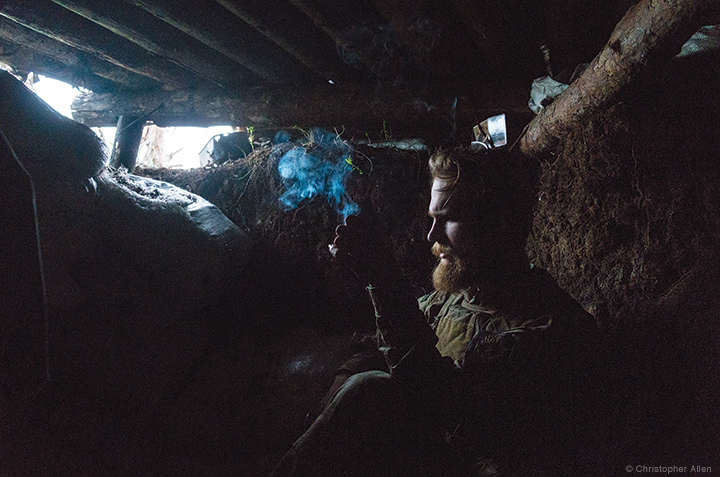
Working with Chris on “With the Donbas Battalion” (from the backlines of West Philadelphia, thank you very much) was one of the most gratifying experiences of my editing career. His first draft was a tad overwritten—understandable for someone who had never tackled a magazine feature before—but the combination of in-the-trenches reportage and his sharp, sometimes offbeat, observations was riveting. When I’d ask him to flesh out characters or provide background on the conflict, he did so quickly and adroitly. He didn’t even complain when I told him we weren’t going to use his proposed title, taken from a Donbas soldier’s jaundiced view of the fighting: “My Fucking Summer Holiday.”
Both his writing and his refusal to produce overly simplistic storylines about the fighters inspired a letter to the editor from a knowledgeable alumna, Martha Bohachevsky-Chomiak CW’60. She didn’t know Chris, but as a scholar and former director of the Fulbright Exchange Program in Kiev, she wrote, “I appreciated this article greatly, since I know firsthand how difficult it is to write about the complexities that confront contemporary Ukraine.”
Not only did he present a “difficult subject clearly and with feeling,” but he was “concise without simplifying his subject.” Benjamin Franklin, she concluded, “would be pleased by the Gazette’s groundbreaking frontline reporting.”
There’s so many shades to truth. There are a million reasons why this war is happening. You ask each person and it’s a different reason. It’s like Tolstoy said: there’s an infinite calculus to history … But the media has to say something. So they package it to fit their narrative. In history class you do the same thing. You have a thesis, and you pull the facts in order to support that thesis. That’s why I don’t want to just do journalism. There’s more to the truth than that …
Maybe ‘my’ truth is the only truth we have access to. Journalism doesn’t give you space to tell that story very often.
— From a 2014 Skype interview with Chris by Jesse Hughes.
Shortly after leaving the Donbas Battalion, Chris went to Donetsk, which was still plenty hot. Then he heard that the outfit was leaving for a raid of Ilovaisk, some 30 miles away, and tried to rejoin them. It was a good thing he didn’t succeed, says Sava, since the battalion got ambushed and a number of men died. But Chris had a close call of his own.
John and Joyce were in San Francisco, enjoying the Bay, when they got a call from Eddie. “Chris is in trouble,” he told them.
According to John, Chris and a Belgian journalist had been trying to locate the battalion when they were stopped by separatists, who arrested them and “bundled them into a makeshift prison. That was very worrying, because they didn’t know where they were going. They could have taken them to a field and shot them, and nobody would have known.”
Chris managed to take a picture of an SUV (and its license plate) belonging to a well-known warlord, and texted the photo to Eddie in Philadelphia, along with instructions to contact the State Department and put word of his capture out on Twitter. Chris later told Jesse that the separatists had “threatened to hang me and cut my ears off and nail them to the wall if they found out I was a mercenary” or a spy.
By most people’s standards—certainly by mine—this is pretty extreme risk-taking. And yet: for all the risks, Chris was “absolutely not reckless,” in Sava’s opinion. “He was brave but always very cautious, and conscious about risks he was taking. He took responsibility to be part of military battalions. If you need to lie down and wait until the shelling is ended, then he did it.” Chris always asked what he could and should not do, Sava adds. “So he took risks, but not more than others did.”
That fall, Mitchell Orenstein, professor and chair of Russian and East European studies, was teaching his Penn class on Russia and Eastern Europe in International Affairs. Acting on a suggestion from Alan McIntyre, who was auditing the class, Chris agreed to talk to the students via Skype from the frontline.
“Chris’s presentation was wonderful,” says McIntyre. “He just stood in a field in Ukraine and talked. It showed me he would have been a wonderful teacher.”
At that time Chris was embedded with Right Sector, a far-right militia and nationalist political movement. “He had a lot to say about the people fighting and the conditions,” notes Orenstein. “He mentioned that he thought Right Sector were making their money from cigarette smuggling. He was very informative, though I don’t think he was too heavily involved in combat operations.”
One thing did strike him as odd, though: Chris’s “obsession with why men go to war zones,” which “seemed to reflect the reasons for his own fascination.”
In a sense, Chris responded to that observation in a lengthy article about European mercenaries published in August 2015 by Vice, based on his time with the pro-Ukrainian Azov Regiment.
Those soldiers, he wrote, “have actualized our own very normal fascination with war—one that most satisfy by joining national militaries—or, more passively, through video games and movies—but which, once experienced in real life, cannot be simulated in a training camp, in the cinema, or on a PlayStation.”
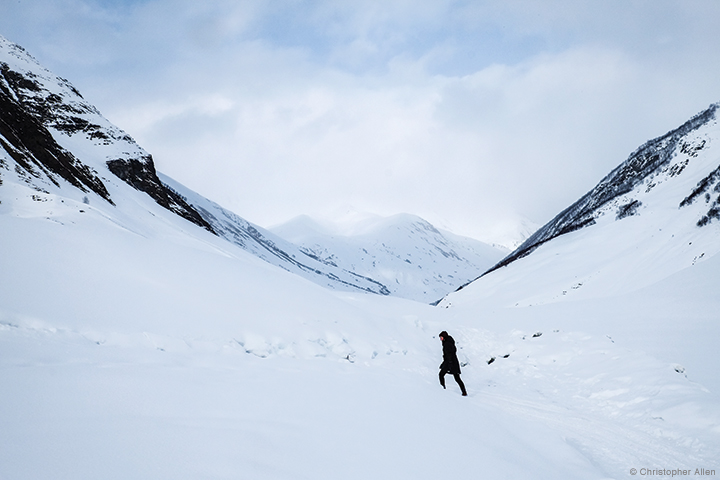
Helena Boeykens is sitting in our breakfast room on a cold February afternoon, talking about the Chris she knew, who was slightly different from the Chris his male friends knew. It’s her third trip to the States since he died, all spent with Joyce and John. She is gentle and bright-eyed, somewhat girlish in her mannerisms—and also whip-smart, principled, and possessed of a quiet strength.
“I have this completely different sense of who he was on an emotional level,” she says. “He was so romantic, so gentle—he tried to take care of me, and he protected me. Even on a superficial level he was not tough or anything like that. So kind, and such a good heart. And that went really well with who I am.”
They met late in the summer of 2015, when they were both living in Brussels, and Chris was getting over the viral meningitis that had landed him in a Kiev hospital. She was a third-year student at the University of Slavic Studies, feeling somewhat confined in the city of her birth and preparing to go on an exchange program to Warsaw. He was about to return to Ukraine.
“Chris and I often talked about what moment in life made you an adult,” she says. “After that year I could say I grew up a lot.”
They met online. “That’s maybe not such a romantic way to meet,” she says with a bit of a smile. Their first date was “awful,” mainly because it didn’t last very long. “It was very late, and we talked maybe 45 minutes, and I said I had to go because I had to wake up very early. But it was such an interesting conversation, actually. He made a really big impression on me.”
At first it was the sound of his voice, which she found “really unique.” Then it was “the way he was so comfortable with himself and seemed like he knew what he was going to do in life. He had this will to do things.”
Though she was four years younger, they had a lot of shared interests and passions. “He talked about Ukraine and about the time he got captured by the separatists,” she says. “I knew about the conflict. We talked about Tolstoy, who was my favorite writer. Chris was crazy about War and Peace. When he talked to you, he was really listening to you, and he wanted to hear what you had to say. Everything else disappeared in the background.”
After they both left Brussels for Warsaw and Kiev, “We sort of said goodbye,” she says. “But after a week he texted me. ‘Helena, do you want to meet in Lviv next weekend?’”
Yes, she did. They both drove all night to meet in that city, roughly halfway between their respective locales, and spent “an incredible weekend” together. Then Chris visited her in Warsaw. “We didn’t put on boundaries for each other or anything,” she says, “but we did travel long distances to be with each other. We both felt like this was not just something.”
There is a war being waged in Ukraine, but this one is not being fought from trenches in the east. It is being played out on television sets and in the minds of viewers on an informational frontline where oligarchs and politicians fight for influence.
—From “Who Owns Ukraine’s Media?” in the May 18, 2016, Al Jazeera.
By the time that article was published, Chris was sharing a Kiev apartment with Sava and had reluctantly taken an office job in that city with Boston-based PDFfiller. But his journalism career was foundering.
“He was so frustrated with the fact that people weren’t interested in his stories,” says Helena. “He thought that what he was writing was way more valuable than breaking news. He was there with the people, and the social context or the environment around the story he was writing was sometimes more important than just pitching the story itself.”
The freelancer’s life is a brutal one, and there were only so many stories about Ukraine that someone whose facility with that language was less than perfect could sell, especially now that the fighting had calmed down. He began to cast his net wider.
Early in 2016 he traveled to Nusaybin, Turkey, near the Syrian border, to interview Kurdish volunteers in their struggle with the Erdogan government. In March the Maghreb and Orient Courier published his article “Nusaybin: Erdogan’s Private Civil (Kurdish) War.” Two months later the Courier published the raw interviews. As always, his questions elicited answers that revealed the soldiers’ variegated reasons for fighting.
“I think Chris was just getting to the point where he would consider himself a journalist,” says Eddie. “He held himself to high standards in that way. He wanted to be part of history, and he believed that history is made up of these micro-stories of normal people. Journalism was a way to really get in touch with these people and to understand them as human beings.”
Heading to Belarus— needed to leave and switch passports/get a new visa anyway, so it was a convenient excuse for a short holiday.
—Email from Chris, October 30, 2016.
It was only recently that I learned the real reason for that holiday in Belarus.
“Chris never talked to us about women,” Joyce says. “He comes back from Belarus, and he calls us and says, ‘Oh, it’s so great—I had such a great time!’ And John and I are looking at each other, thinking, ‘What’s her name?’ Like, who talks about Belarus in November like this? So I said, ‘Did you go with friends?’”
“I know where you’re going with that,” he responded. “When there’s something to tell, I will tell you.”
The budding romance wasn’t always long-stemmed roses, of course.
“We really had some big arguments,” Helena says. “But we would always talk it through. We would really get into the other’s psyche, and it would build up to this climax. Those moments were so intense.”
Once, in Georgia, they hiked up a mountain to visit a monastery. “The whole way up we were discussing this thing and getting more and more heated, until we got to the top, and we were just—angry.” They went through the monastery separately, ignoring each other. Afterwards she found Chris sitting alone on a rock, taking pictures of another couple.
“Well, I admit that I was wrong,” she remembers saying as she sat down beside him. “But why can’t you admit that you were wrong?” Gradually, he did, and they talked it over—and over—and finally worked it out. “And all the way down, we were just laughing and laughing and falling …”
They had a little saying, almost a mantra, she explains. One of them would say, “We’re good together, aren’t we?” And the other would respond, “We’re so good together.”
By the time Joyce and John called him in July 2017, Chris was ready to fess up.
“‘This is really special,’” Joyce recalls him saying. “‘She’s different from any other woman I’ve ever known. She’s attractive and so smart. She speaks six languages. She’s ready for an adventure.’” Then he handed the phone to Helena.
Joyce remembers one thing clearly from that first conversation with the young woman she would soon grow to love. By then Chris had made his plans and would be leaving for South Sudan, by way of Uganda, in less than a month.
“I was just so scared,” says Joyce. “We didn’t want him to go. I said to Helena when I met her on the phone that first time, ‘We’ve got to bring that guy back.’”
As insanely risky as his journey looked to be, no one who knew Chris believes that he had any intention of not coming back. He had too many things he was excited about doing, too many places he wanted to go—and now the love of his life to do them with.
Nor, for all his high-minded principles, was he naïve. He saw through people quickly, and given the time he had spent on the frontlines of Ukraine and in Turkey with Kurdish fighters, he knew full well the dangers of war.
But still: Why South Sudan, which is highly dangerous and openly hostile to journalists, some of whom have been killed there, many of whom were banned from the country? Especially since it isn’t on most Westerners’ radars and is thus a much harder sell for a freelancer.
To some extent, he probably saw South Sudan as a place where he could make his mark. Most war correspondents, both freelance and salaried, were heading to places like Mosul to cover the war against ISIS. And a good number of fighters in South Sudan spoke at least some English.
“He was at a point where he really had to make a drastic change,” says Eddie. “We always talked about what holds you back, what factors in life make it difficult to break out of something, to do your own thing and be independent. Chris made his own decisions, regardless of what anyone else said. And early that summer he made the decision to go.”
“He felt he needed to broaden his brush a bit and gain more experience,” says John. “This was something that people weren’t covering that he could carve out a little niche for himself, maybe, in a very competitive market.”
Finally, Chris had long been fascinated by Africa, the source of so many explorers’ stories and the subject of his senior thesis at Penn.
“It’s sad to think of his journey to South Sudan as something he did just because he wanted more experience,” says Helena. “He was always drawn to Africa. All the writers he read” had spent time there. “So it was on his path.”
Until Chris was preparing to go, she knew little about South Sudan—or about freelancing in war zones. “He was the freelance journalist and I was a student, so I had the feeling that he knew what he was doing. I never tried to stop him from going.”
It was only when he booked his flight—two weeks before he left—that she started reading up on his destination. Then, she says, “I was just really scared.”
And with good reason. The five-year civil war between the government of South Sudan (which became independent from Sudan in 2011) and the rebel factions had left tens of thousands dead and millions uprooted. Three years ago, President Salva Kiir threatened to kill journalists who reported “against the country.” Seven were killed that year.
During their final days together in Brussels, Helena helped with last-minute preparations, researching medical issues—his biggest concern was getting sick—and accompanying him to the hospital for shots. She recalls sitting next to him when he was talking on WhatsApp with Lam Paul Gabriel, spokesman for the SPLM-IO.
“It was all so easy,” she says. “It was like, ‘Okay, let’s meet then, there, and I’ll be in Kampala [Uganda] then. Okay, fine, we’ll leave at 8:00.’ That was it. Just a couple of messages. He could have done more homework, for sure.”
Chris did speak with a number of journalists and got a productive list of contacts. But there were some less tangible things he didn’t get.
“I said to him, ‘You need to take a month or so, just getting the feel of Africa,’” John says. “‘You’ve never been there before. Could you believe everything people say? I regret he didn’t really do that.”
Some of his fellow journalists were helpful—up to a point. Simona Foltyn, a Dubai-based freelancer who wrote a searching article about his death for the Columbia Journalism Review, was one of those with extensive experience in Africa to whom Chris reached out.Though she gave him some contacts, she acknowledged in her article that she hadn’t volunteered “any other information on how to navigate rebel-held South Sudan, a mistake that has been a great source of guilt.” After speculating that a similar desire for exclusive coverage may have kept him from divulging details of his own plans when he wrote her again, she added: “In the end, we were both freelancers pitching stories to the same few outlets that still cover international conflict …”
Chris and Helena spent their last moments together hurrying to the train station that would take him to Brussels Airport. As they approached the waiting train, each lugging a heavy bag, Helena voiced their old refrain: “Oh, we’re so good together.”
“We’re so good together,” Chris answered. Then they said their goodbyes, as they had so many times over the past two years.
“We were both sad,” she says quietly. “But we just said, ‘Well, we’ll see each other in Ukraine two months from now. It’s going to be over fast.’”
I arrived in South Sudan only a few days after flying from Ukraine, but it feels like ages ago. The contrast between the outside world and this place that I find myself in is stark—and makes Europe feel very far in time and space … This feeling … is magnified by the lack of activity here and the perpetual sense of waiting … I thought relationships with the soldiers would be easy here because most people speak some English, but in fact, I’ve found it somehow more difficult than Ukraine.
—From an unfinished letter to Helena Boeykens, August 18–22, 2017.
Chris arrived at Entebbe International Airport on August 1, after a punishing series of flights, and spent some of his time in Kampala finishing his work for PDFfiller. Three nights later, he and Lam Paul Gabriel took a bus to Yumbe, Uganda, some 20 miles from the border with South Sudan. On August 5, he crossed the border (possibly with a bribe) into the South Sudanese state of Equatoria. He was now with the rebels of the SPLM-IO.
Matata Frank, the rebel governor of the Yei River state, told Foltyn that Chris’s “only motivation was to find out exactly the truth about the war in South Sudan,” adding: “We had really a lot of hope in him. Everybody was banking on him when he gets back [to tell] their real, actual stories that people are going through.”
But from the outset, Frank told her, “he wanted to cover the actual fighting. He kept on asking me especially, when are we going to the war? Where are we going to attack?”
Complete frustration with this uncivilized backwater … where even soldiers can’t get time distance & direction right. Where everything takes longer than people say by minutes or weeks. Fucking tired and frustrated. How much longer …
—From Field Notes Notebook #2, August 13, 2017.
Chris spent the bulk of his time in Panyume, which he described in his notes as a “desolate little town deserted except for one merchant who sells biscuits, tobacco, soda, and peanuts.” (When I searched Google Maps for Panyume and the village of Iandu, Chris’s other camp, both came up blank.) He was staying with Matata Frank, who, he wrote, “carries himself with the cocky assurance of somebody who commands respect, but who was only given it late in life.”
Accompanied by guards and Juma, his minder and translator, Chris walked to other villages in the area, interviewing residents about the war and its impact. Judging by the list of “Books Read” in his journal—eight in all, ranging from Ryszard Kapuscinski’s The Soccer War to James Joyce’s A Portrait of the Artist as a Young Man—he had a lot more down time on his hands than he had bargained for. But at least he had an exclusive.
Then, on the eve of the battle, he learned that the rebels had agreed to let two journalists from Reuters join them.
John and Joyce talked to him the night before the battle. “He said the communications person lied to him,” says Joyce. “Reuters had made contact even before Chris had, but he was never told that. He said, ‘So now that Reuters is here we’re going out?’ But he was very committed to the men whose stories he’s telling every day.”
“He thought this was his exclusive,” says John. “And these guys had creds—they weren’t even freelancers. We do wonder if he took more risk than he would have because of those guys.”
“Allen, he didn’t want rivals around, so he was not very happy when he saw [them],” Gabriel told Foltyn. “Their presence gave him that pressure, that he wanted to cover something more.”
Unlike the Reuters correspondents, though, Chris had already spent three weeks with the rebels. Even without the battle, he had a lot of singular material.
“We said, ‘You’ve got your story. Just walk from this one,’” says John. “But he didn’t want to [cover] it from a mile back. He wanted to be there with the guys right in front.”
“We said, ‘Look, you have what Reuters could never have, which is three weeks of living with these guys. You can tell a story that nobody else can tell,’” adds Joyce. “He said, ‘It’s not the whole story.’”
25 August — march to attack
The air pressure in the town seems to drop the day the attack is announced in the morning. The vacuum which once existed has been broken but the spirit hasn’t yet rushed in to fill it. The parade is cancelled because of rain but in the late afternoon the attack becomes a reality. As the men distribute ammunition and red arm bands, as they gather together on the open field in front of one of the village’s abandoned schools, they chant and dance, talk excitedly.
Each man has only 20 rounds, 2 magazines. “We are rebels, we don’t have enough [ammunition],” says our roommate. “We will take them from the enemy.”
—From the final entry in Field Notes Notebook #3.
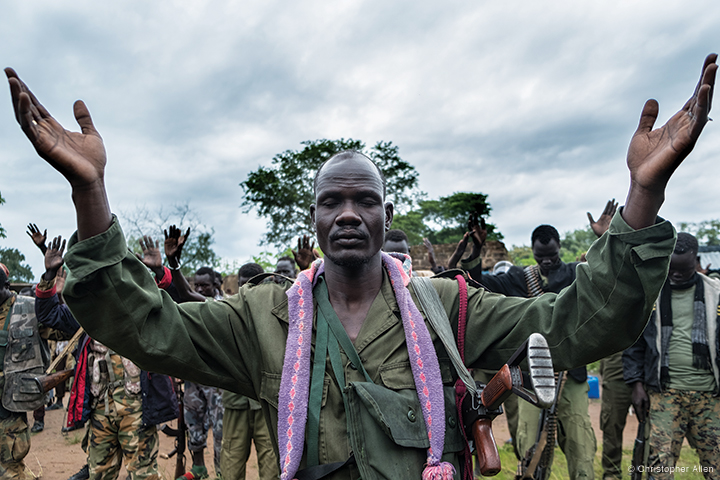
I’m not going to say much about the Battle of Kaya, which appears to have been a foolish, badly planned attack by an under-trained and under-armed rebel force hoping to capture weapons and ammunition. It ended in a rout—one with tragic collateral damage. In her CJR article, Foltyn quotes a rebel intelligence officer who had tried to convince the three journalists to stay behind until the town was cleared: “They refused, all of them. I was like, What can I do?”
There was apparently a moment of decision that may or may not have been fatal.
“It was a pronged attack, I believe,” says John. “And there was a fork where they divided up, as I understand it, and the two Reuters guys went one way.” Chris went the other.
Despite some reports to the contrary, he was not wearing his bulletproof vest or press badge. As foolhardy as that sounds, the decision to leave the 20-pound vest behind for a hard overnight march was neither illogical nor one he would have made lightly.
“I know he had a conversation with some other journalists about whether or not to wear his flak vest and whether to identify as a journalist,” says his brother. “Ultimately he decided that the bulletproof vest would slow him down and that the press badge would make him a target.”
There is always a “tradeoff between mobility and protection,” noted Foltyn in the CJR, and the vests are “impractical, especially given that the rebels don’t wear body armor and are already difficult enough to keep up with.” And given that he was shot in the head and twice in the neck, it wouldn’t have mattered.
After his death was announced, a South Sudanese information minister told Voice of America that Chris was a “white rebel” who had come into the country illegally. Two days later, the government changed its tone and called his death “regrettable.” But it also ruled out an investigation, despite calls to do so by UNESCO and the Committee to Protect Journalists. “Taking photographs and reporting events is not attacking,” said the CPJ’s Angela Quintal. “It is journalistic work done by civilians, who are protected under international law.”
Whether the soldier who fired the fatal shots realized that Chris was a journalist is a question that can’t be resolved from West Philadelphia. It’s unlikely to be resolved by anyone who will tell the world. And no answer would change what happened.
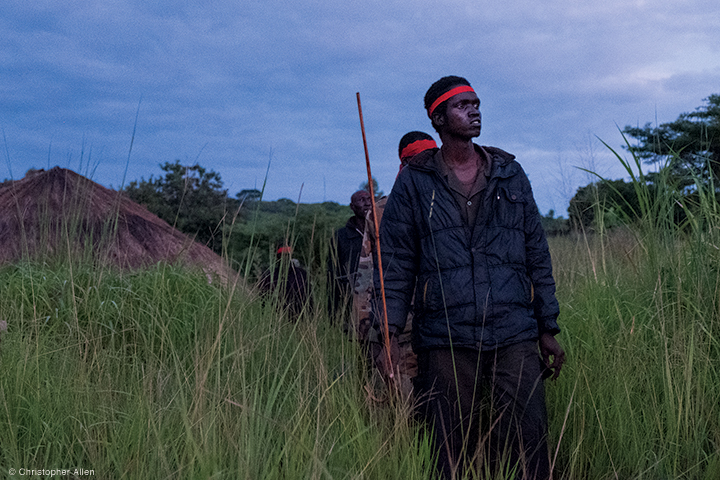
Joyce and John were in Southern California, staying at her brother Leon’s house. They had just sold their Narberth home and driven across the country, stopping at Yellowstone and other parks along the way. Their next destination was Colorado, where Chris’s brother and his wife were about to have a baby. Despite the chaos and uncertainty of being homeless for the first time since they were married in 1990, Joyce and John were excited—about the new life they were going to start in Maine (once they found a house), and especially about the prospect of their first grandchild.
When they woke around 7:00, Joyce checked her email and saw there was a message from the State Department asking them to call a number. There were missed calls from Lam Paul Gabriel and Helena, who had also sent an urgent Facebook friend request. They called the State Department and were put through to the American embassy in Juba.
What they heard next was the message, bluntly delivered, that would change their world forever.
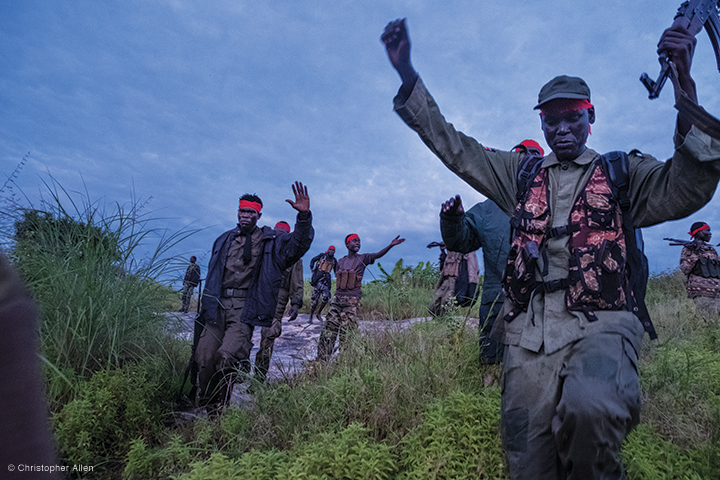
No words can do justice to the slow-motion nightmare they’ve lived through in the year since Chris’s death. Yet somehow they’ve kept moving. In November they arranged a memorial service at Germantown Friends, attended by more than 300 people, some coming from Europe and Australia and Ukraine. Many spoke movingly about their friend, student, mentor—and son. Three months later, Villanova University hosted an exhibition of war-zone photos by Chris and other photojournalists, put together by two freelance journalists (Osie Greenway and Anne Alling) whom Chris had met in Europe. Joyce and John spoke at that event, too. They met with US Senator Bob Casey, who promised to press the South Sudanese government for answers about Chris’s death, though he couldn’t offer much hope. In March, Joyce, John, and Eddie flew to Ukraine to find a site in the Carpathian Mountains to scatter his ashes, as Chris had requested. (By then Helena was in the Philippines, working for an NGO. She’s still there.) In June Joyce spoke at the Newseum, which honored Chris and 16 other journalists from around the world who had been killed doing their jobs.
“It’s sort of been all-consuming for this time,” admits Chris’s brother. “So in certain ways I feel relief as we get through these chapters. And I feel relief for my parents, just as time goes on.”
His parents are still homeless, house-sitting for friends and kind strangers, still looking for the right house in Maine. Wherever they end up, they want their home to have a place where war-weary freelance journalists can stay. (They also started the Christopher Allen Fund, proceeds for which will support the “work and safety of freelance journalists globally.”)
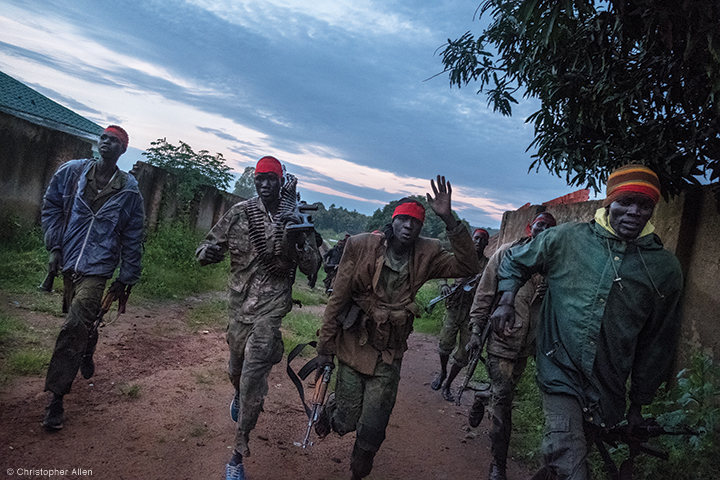
“Sometimes I just keep expecting him to walk through the door with that love of life and the curiosity,” Joyce was saying last spring. “He was in many ways just—big. I think he got my spirituality—intuited it. I don’t think he could articulate it. But we shared something pretty profound.”
Of course, she’s angry, too, and often confronts Chris in her mind: Why did you do that? You’ve deprived us of so much. You’ve deprived yourself. And you’ve deprived Helena, who is such a kindred spirit.
“I don’t think he would have wanted to put us through this,” says John. “I think if he’d been 10 years older he would have known how terrible this is for everybody, how life-altering for everybody around him that would be. I know Joyce said to him that our lives would be changed forever if he died. But I don’t think he really understood that.
“He was very confident he would make it out of there,” John adds, acknowledging that he may have been too confident. “If he’d only held back, been more conservative, he might have made it. If those [Reuters] journalists hadn’t been there, he might have gone the other way. Who knows?”
“I think his mode of living was going to result in him getting hurt or killed,” says Chris’s brother. And yet, he adds: “Not very many people get to die doing what they’re passionate about doing. He definitely was out there living life to the fullest, and living his life how he wanted to live it.”
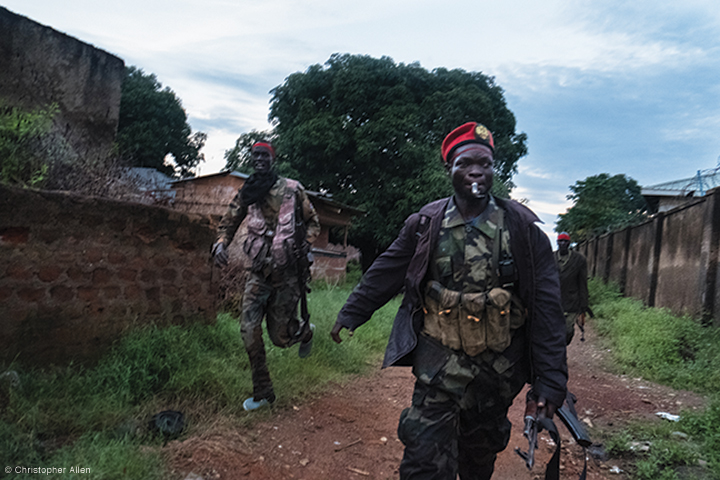
Barbie Zelizer Gr’90, the Raymond Williams Professor of Communication and the founding director of the Center for Media at Risk, has a lot to say about the importance of covering dangerous and remote places. Some of it is beyond the scope of this article. But having been a journalist herself, and noting the escalating attacks on journalists everywhere—including the US—she is emphatic about the need to avoid blaming them for daring to cover dangerous parts of the world.
“When we begin to say that it’s okay to go to Ukraine, and it’s not okay to go to South Sudan, that becomes something of a slippery slope,” she says. “These events, these countries deserve coverage. The problem isn’t with Chris wanting to go there. It’s with the institutions not providing the kinds of requisite protections.”
I ask if she has any words for those still grieving.
“That’s a heavy-duty ask,” she says after a brief pause. “I would only say that it’s not the individual’s fault. It is the individual’s triumph. And if you don’t have individuals who are willing to take these risks, then journalism at large falls short.
“Journalism as an institution can’t do the reporting itself,” she adds. “So the triumph belongs to those who go down there and venture out into dangerous situations. And that’s something I don’t think you can ever take away.”
This is Samuel Hughes’s last article as senior editor of the Gazette. He thanks readers for their indulgence over the years and can be reached at [email protected].


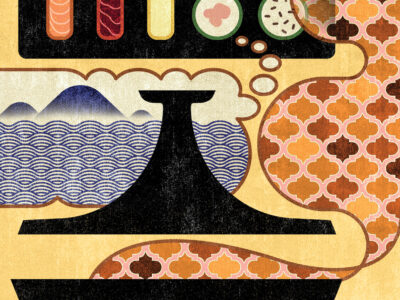

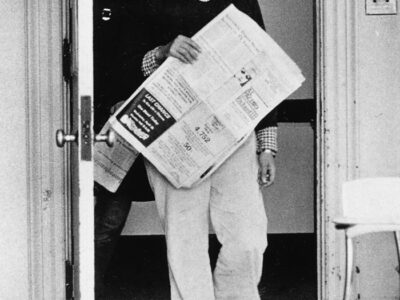
Thank you Mr. Hughs for such a powerful article. I may not have personally known Christopher, but there is a youthful spark of ambition, determination and bravery that has been displayed to me. I have learned so much from his adventurous Sometimes risks are taken for results to be seen. In him I have seen an epitome of determination and bravery, motivating me to not be afraid of what I love doing and the things that I’m passionate about. Thank you once again.
Dear Sam,
What a moving tribute to Chris Allen, and to you as well for the sensibity and craftsmanship that shines through this whole “goodbye” article. Exceptionally well done.
Jonathan
Thank you Sam, for such a thoughtful, insightful article about our beloved Chris. He and Helena visited me in England just a month before his death, it is still hard to think there will never be another call asking if he can visit for a few days. As his aunt, I think I was a sort of second family home in Europe. Family was very important to him. Whenever he visited, we talked and argued constantly, and he was always frustrated if I didn’t express an opinion on some topic or another, when he left I was usually mentally exhausted! There was so much life in him, and he crammed so much into his short life, he will never be forgotten.